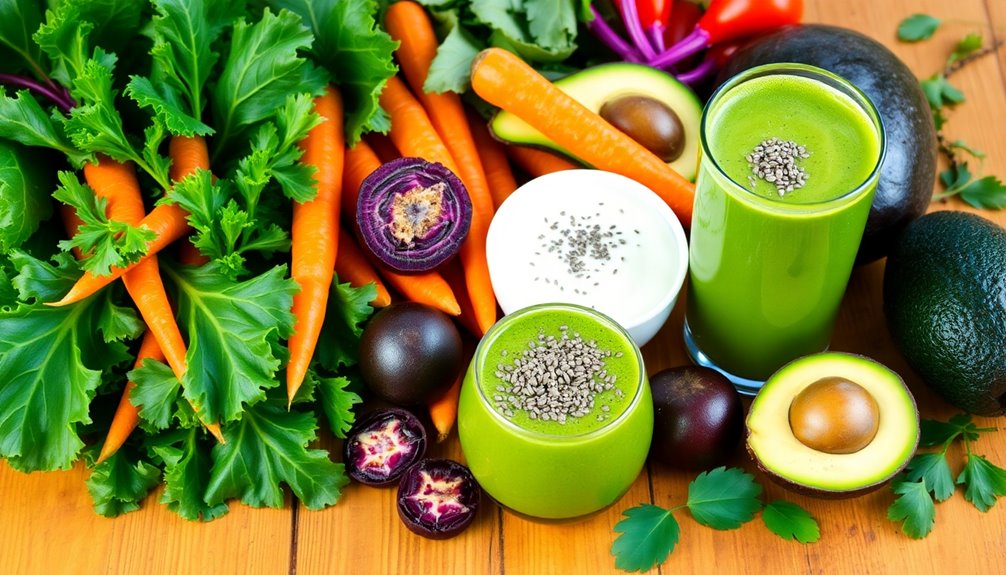To boost your gut health, start by increasing your fiber intake with fruits, vegetables, legumes, nuts, and seeds. Incorporate fermented foods like yogurt and sauerkraut to introduce beneficial probiotics. Make sure you stay hydrated, as proper hydration supports digestion and nutrient absorption. Limit processed sugars, which can disrupt your gut microbiota, and choose lean proteins like chicken and fatty fish for their health benefits. Don't forget to add prebiotic foods such as garlic and bananas to nourish good bacteria. Finally, practice mindful eating to enhance digestion and awareness. Keep exploring to find even more tips for a healthier gut!
Key Takeaways
- Increase fiber intake by adding fruits, vegetables, legumes, nuts, and seeds to support beneficial gut bacteria and improve digestion.
- Incorporate fermented foods like yogurt and sauerkraut into your diet for a boost of probiotics that enhance gut health.
- Add prebiotic foods, such as garlic, onions, and bananas, to nourish good gut bacteria and improve overall gut function.
- Stay hydrated by drinking water and consuming water-rich foods like cucumbers and melons, which support digestion and nutrient absorption.
- Limit processed sugars by opting for natural sugar substitutes and avoiding hidden sugars in sauces to maintain gut microbiota balance.
Increase Fiber Intake
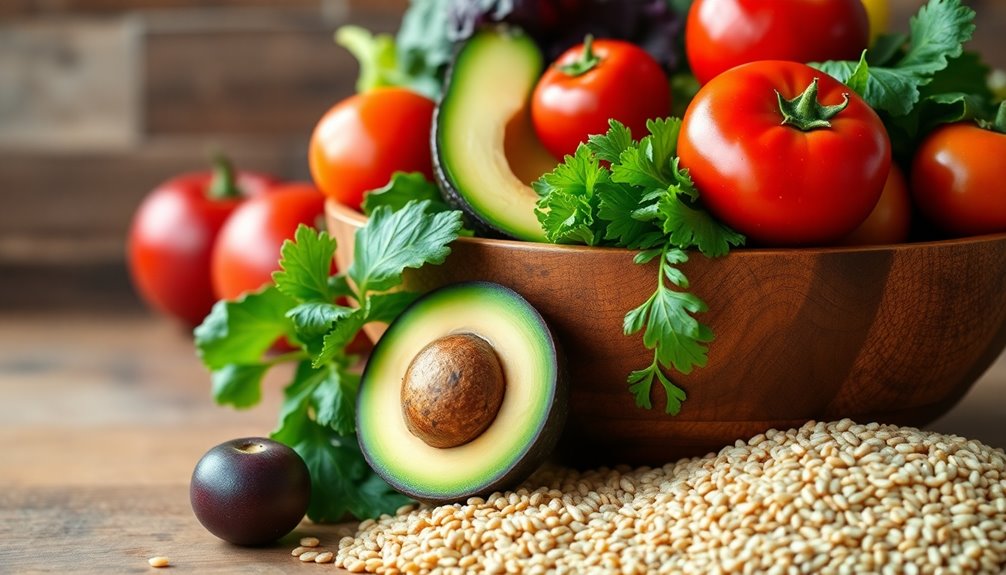
Increasing your fiber intake is one of the most effective ways to boost gut health. When you consume enough fiber, you support the beneficial bacteria in your gut, improving digestion and overall wellness. Incorporating fiber-rich foods into your diet isn't just advantageous; it can also be delicious and fulfilling.
Think about adding gut-friendly snacks to your daily routine. Options like fresh fruits, raw vegetables, and whole grain crackers can give you that fiber boost while keeping you full and invigorated.
You could also try making your own fiber-rich recipes at home. For instance, oatmeal topped with berries makes for a hearty breakfast, while a chickpea salad can be a rejuvenating lunch. By experimenting with different ingredients, you'll discover meals that not only taste great but also nourish your gut.
Don't forget about legumes, nuts, and seeds, which are fantastic sources of fiber. They can easily be added to smoothies, salads, or even baked goods, making it simple to increase your fiber intake without a drastic change in your diet.
As you embrace these nutritious options, you'll likely notice improvements in your digestion and energy levels. Plus, you'll be part of a growing community that values health and wellness through mindful eating. By prioritizing fiber, you're taking a significant step toward better gut health and overall essentiality. Additionally, a healthy gut can regulate overall health, which is crucial for preventing chronic diseases like CKD. So go ahead, get creative in the kitchen, and enjoy those gut-friendly snacks!
Incorporate Fermented Foods

Incorporating fermented foods into your diet can greatly enhance your gut health. These foods are packed with probiotics, which are beneficial bacteria that can improve digestion and strengthen your immune system. Plus, they can make for delicious and gut-friendly snacks!
Here are three easy ways to add fermented foods to your meals:
- Yogurt: Choose plain, unsweetened yogurt rich in live cultures. It's a versatile option that you can enjoy with fruit or granola.
- Sauerkraut and Kimchi: These fermented vegetables aren't just tasty; they also pack a probiotic punch. Toss them into salads or use them as a side dish for your meals.
- Kefir: This drinkable yogurt alternative is a great way to hydrate and get those gut-friendly bacteria. Mix it with smoothies or enjoy it on its own.
If you're looking for a quick boost, consider adding probiotic supplements to your routine. They can offer a concentrated source of probiotics, helping you maintain a healthy gut when you're busy or on the go. Additionally, following a plant-based diet can further enhance your gut health by increasing your fiber intake and providing rich nutrients.
Stay Hydrated

Fermented foods are a fantastic way to enhance your gut health, but don't overlook the significance of staying hydrated. Your body relies on water to support every system, including digestion. When you maintain proper water intake, you help your body break down food and absorb nutrients more effectively. This, in turn, promotes a balanced gut microbiome, which is vital for overall health. Additionally, consuming grain-free alternatives can also contribute to improved gut health by minimizing inflammation caused by traditional bread.
Hydration benefits extend beyond just digestion. When you're well-hydrated, you may experience improved energy levels, better mood regulation, and enhanced cognitive function. All of these factors contribute to a healthier lifestyle, making it easier to stick to dietary changes that support your gut health.
To make sure you're drinking enough water, aim for about eight 8-ounce glasses per day, but remember that individual needs can vary based on activity level and climate. You can also boost your hydration by consuming water-rich foods like fruits and vegetables. Think cucumbers, oranges, and melons—they're delicious and contribute to your daily water intake.
It's easy to overlook hydration amidst busy schedules, but making a conscious effort to drink water throughout the day can lead to significant health improvements. Carry a reusable water bottle with you, set reminders on your phone, or infuse your water with flavors like lemon or mint to make it more enjoyable. By prioritizing hydration, you're taking a simple yet essential step toward better gut health and overall well-being.
Limit Processed Sugars
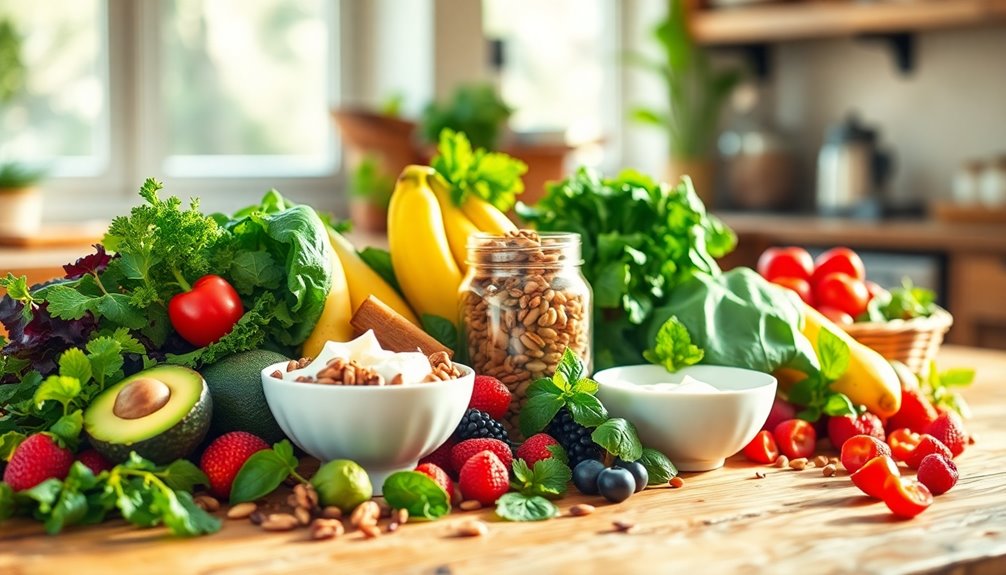
Processed sugars can be surprisingly detrimental to your gut health. These sugars can disrupt the balance of gut microbiota, leading to inflammation and digestive issues. When you consume excessive amounts of processed sugars, you may inadvertently feed harmful bacteria, which can outnumber beneficial ones. This imbalance may contribute to various health problems, including obesity, diabetes, and gut-related disorders. Additionally, an unhealthy gut can also affect overall health, making it crucial to prioritize your dietary choices.
To help your gut thrive, consider these three strategies to limit processed sugars:
- Identify Hidden Sugars: Check food labels for added sugars, especially in sauces, dressings, and snacks. You might be surprised by how much sugar is lurking in these foods.
- Choose Sugar Substitutes: Opt for healthier alternatives like stevia, monk fruit, or erythritol. These sugar substitutes can satisfy your sweet tooth without negatively impacting your gut microbiota.
- Prioritize Whole Foods: Focus on whole, unprocessed foods. Fruits, vegetables, nuts, and whole grains are naturally low in sugar and packed with nutrients that promote gut health.
Add Prebiotic Foods
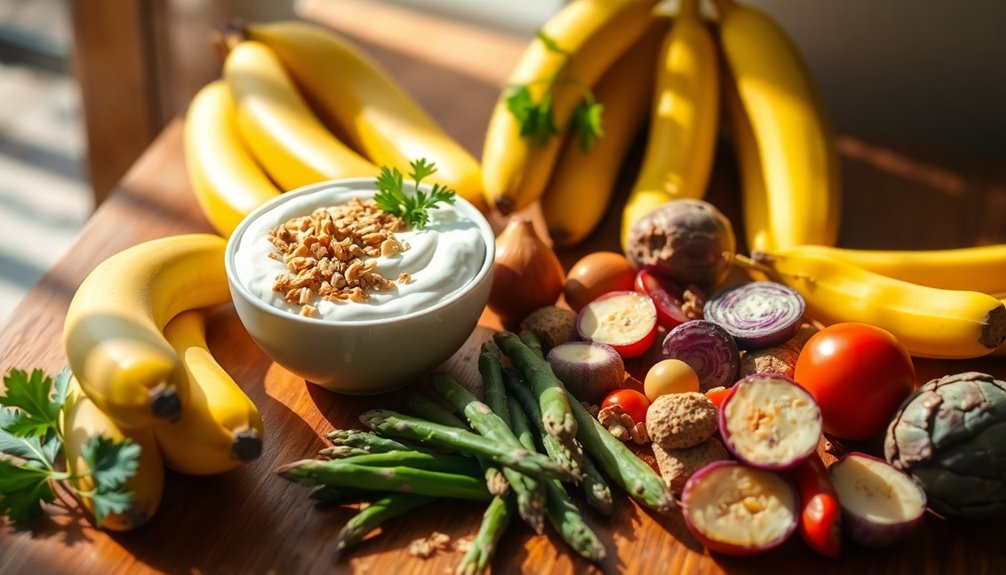
Maintaining a balanced gut microbiome goes beyond limiting processed sugars; adding prebiotic foods can greatly enhance your gut health. Prebiotics are non-digestible fibers that feed the good bacteria in your gut, promoting their growth and activity. By incorporating these foods into your diet, you can create a nurturing environment for your microbiome.
Start by including foods rich in prebiotics, such as garlic, onions, bananas, and asparagus. These ingredients not only add flavor to your meals but also serve as the foundation for gut nourishing recipes.
You might try a delicious garlic and asparagus stir-fry or a banana smoothie packed with almond milk and spinach. These simple meals can be both satisfying and beneficial for your gut.
Additionally, consider snacking on gut friendly snacks like raw vegetables with hummus or a handful of nuts. These options not only keep you full but also provide essential nutrients that support your overall health.
You can even make prebiotic-rich energy balls using oats, nut butter, and a touch of honey, making for a quick snack that's perfect for busy days. Including these foods in your diet aligns with the principles of a custom keto diet that focuses on nutrient-dense ingredients for optimal health.
Choose Lean Proteins

Choosing lean proteins is vital for supporting your gut health and overall well-being. Incorporating the right protein sources into your diet can positively influence your gut bacteria, helping to create a balanced microbiome that supports digestion and boosts immunity.
Here are three excellent lean protein sources you can include:
- Chicken breast: Skinless chicken breast is a fantastic choice, as it's low in fat yet high in protein. It can help your body rebuild and repair tissues, making it a great post-workout option.
- Fish: Fatty fish like salmon or mackerel not only provide lean protein but also deliver healthy omega-3 fatty acids. These fats have anti-inflammatory properties that can benefit your gut health.
- Legumes: Beans, lentils, and chickpeas are plant-based protein sources that are also rich in fiber. Fiber feeds your gut bacteria, promoting their growth and diversity, which is essential for good gut health. Additionally, incorporating whole-food sources of protein into your meals can further enhance your gut health and overall nutrition.
Practice Mindful Eating
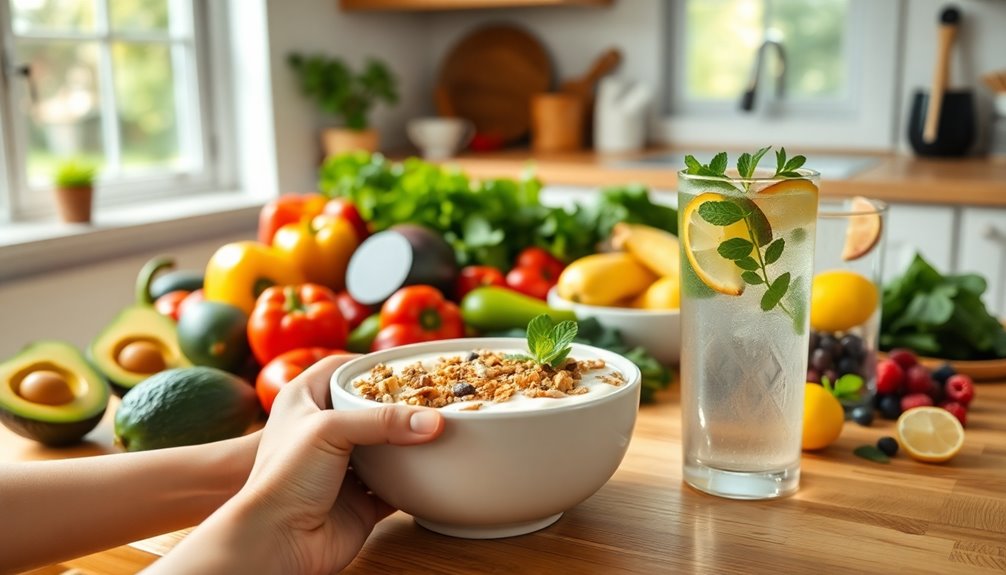
Mindful eating is a powerful practice that can greatly enhance your gut health. By focusing on how you eat, rather than just what you eat, you create a more harmonious relationship with your food. One of the key components of mindful eating is slow eating. When you take your time with meals, you allow your body to properly digest and absorb nutrients, which is essential for gut health. Rushing through meals can lead to overeating and digestive discomfort, so make it a habit to savor each bite.
Another important aspect is mindful chewing. Chewing your food thoroughly not only helps break it down for easier digestion, but it also signals to your body that it's time to process what you're consuming. This practice can enhance nutrient absorption and support a balanced gut microbiome. Aim to chew each bite around 20-30 times, focusing on the textures and flavors.
Incorporating these habits into your daily routine doesn't have to be complicated. You might start by setting aside distractions during meals, like phones or TV. This way, you can fully engage with your food and listen to your body's hunger cues. Additionally, practicing mindfulness meditation can help you develop greater awareness of your eating habits and emotional triggers over time. Over time, these small shifts can lead to significant improvements in how you feel physically and emotionally.
Frequently Asked Questions
How Long Does It Take to Notice Gut Health Improvements?
When you make changes to your diet, you can start noticing gut health progress within a few days to a couple of weeks. This dietary timeline varies based on your individual circumstances, such as your current diet and gut health.
Many people report feeling improvements in digestion and energy levels fairly quickly. Patience is key, though—sustained changes often lead to more significant benefits over time, so stick with it for the best results!
Are There Specific Foods to Avoid for Gut Health?
Picture a garden thriving with vibrant gut health superfoods—colorful fruits, crisp vegetables, and wholesome grains.
Now, imagine the gut health enemies lurking among the blooms. Processed foods, excessive sugar, and artificial additives can stifle your gut's harmony. They disrupt the balance of beneficial gut bacteria, leading to discomfort.
Can Supplements Replace Dietary Changes for Gut Health?
Supplements can't fully replace dietary changes for gut health. While probiotics provide benefits by introducing good bacteria, they work best alongside a balanced diet. Increasing your fiber intake from whole foods like fruits, vegetables, and whole grains enhances gut function, fostering a healthy microbiome.
Relying solely on supplements might leave gaps in your nutrition. Embracing dietary changes supports your gut health more effectively, creating a solid foundation for overall well-being and community.
How Do Stress Levels Affect Gut Health?
Stress levels can greatly impact your gut health through the gut-brain axis. When you're stressed, your body releases hormones that disrupt digestion and lead to gut issues. Stress management techniques, like mindfulness or regular exercise, can help restore balance.
Is Gut Health Linked to Mental Health?
Think of your gut and brain as dance partners, moving in sync. Yes, gut health is linked to mental health through the gut-brain connection. When you nurture your gut with probiotics, you're not just aiding digestion; you're also enhancing your mood and cognitive function.
Studies show a healthy gut can lead to reduced anxiety and depression. So, take care of your gut, and you'll likely find your mental well-being improves, too.
Conclusion
In the garden of your gut, nurturing it with simple dietary changes is like tending to vibrant flowers. By increasing fiber, adding fermented foods, and staying hydrated, you cultivate a thriving ecosystem. Limiting processed sugars and embracing prebiotic foods are akin to removing weeds that hinder growth. Choosing lean proteins and practicing mindful eating guarantees your garden flourishes. As you tend to these habits, watch your gut health bloom, enriching your overall well-being and cruciality.

